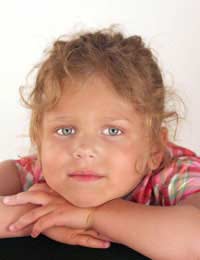What is Rett Syndrome?

Rett Syndrome is a developmental disorder in the autism spectrum that occurs almost always in girls, though it has been seen in boys in rare cases. It becomes apparent in infancy when a baby girl seems to develop as normal for a few months, but then anywhere between three months and three years of age the girl will stop developing and even lose the skills that she had already acquired. The loss of speech is common in Rett Syndrome and is often one of the first skills lost.
Symptoms of Rett Syndrome
The plateau and even loss of skills and abilities are two of the defining symptoms of Rett Syndrome. The loss of purposeful hand movements (grasping, reaching and touching on purpose), loss of speech, balance problems, disorganised breathing patterns like hyperventilation or breath holding, coordination problems, stereotypic hand movements (particularly wringing), anxiety and social and behavioural problems are all common symptoms of Rett Syndrome. Commonly associated issues, though not necessarily considered symptoms, include scoliosis of the spine, seizures, heart problems, trouble with chewing and swallowing as well as disrupted sleep. Rett Syndrome includes a wide range of symptoms as well as a wide range of symptoms levels from mild to severe, so girls with Rett Syndrome may not always seem similar to the average observer.Phases of Rett Syndrome
There are four recognised phases of Rett Syndrome. Early Onset Phase begins when a girl's normal development stalls or stops completely. Rapid Destructive Phase begins when the girl loses the skills and abilities she had previously acquired. The loss of speech and purposeful hand movements tend to be the first symptoms of this phase. Plateau Phase begins when the girl's regression slows down and might even appear to improve. This Phase can be prolonged, and in fact many girls with Rett Syndrome will be considered to be in Plateau Phase for most of their lives. Late Motor Deterioration Phase then is characterised by a loss of muscle tone that leaves a girl stiff and possibly even immobile, though with no further decline of cognition or communication skills.Diagnosis of Rett Syndrome
A diagnosis of Rett Syndrome requires both a molecular diagnosis and a clinical diagnosis. This means that a genetic mutation, MECP2, must be confirmed (molecular diagnosis) and diagnostic criteria must be met (clinical diagnosis). This diagnostic criteria includes the symptoms, such as loss of purposeful hand movement, loss of speech and stereotypic hand motions, which can easily be observed.Treatment of Rett Syndrome
Rett Syndrome involves a number of different symptoms in a number of different parts and systems of the body. There is no cure for Rett Syndrome, so treating it means attempting to slow the loss of abilities, improve a girl's movement and help her communicate with others. Physical therapists, occupational therapists and speech-language therapists will all be a part of the treatment team for a girl with Rett Syndrome. Speech-language therapists will help girls communicate without speech, such as through picture boards, letter or word boards, communication devices such as voice output devices or even eye gaze responses.Rett Syndrome is developmental disorder characterised by a loss of purposeful skills including the loss of speech. Girls with Rett Syndrome can be treated by a team of therapists and movement and communication can be improved, but Rett Syndrome can not be cured at this time. Finding adaptive techniques for communication is a large part of treating girls with Rett Syndrome so that they can continue their lives and educations despite their unique challenges.
- Developmental Disabilities and Speech Difficulties
- What is Backing Disorder?
- Coping With Tourettes Syndrome
- Orofacial Myofunctional Disorders
- Questionnaire: Does My Child Have a Speech Disorder?
- Expressive Language Disorder
- Receptive Language Disorders
- Children's Speech Sound Disorders
- All About the Voice Disorder Spasmodic Dysphonia
- Specific Difficulties in Producing Sounds
- Stammering
- Voice Disorders
- Dyspraxia
- Lisps
- Apraxia of Speech
- Speech Delay
- Phonemic Disorders & Speech Impediments
- Dysarthria
- Dysprosody
- Selective Mutism
- Language Based Learning Disabilities
- Articulation Disorders
- Cluttering
- Aphasia


Re: Augmentative and Alternative Communication
Kak esehiko sminor k112 speechdisorder.co.uk
Re: The Lidcombe Program
My 3 year old has started to stammer about 5 weeks ago and has progressed very fast and now it affect every word she pronounces and I am…
Re: Child Abuse and Speech Disorders
I stopped talking to my dad in my normal voice when I was in grade 1 after he hit me because I couldn’t understand my…
Re: New Earpiece to Help With Stammering
I am interested in being assessed for the use of the SpeechEasy hearing device and would be grateful if someone could…
Re: The Lidcombe Program
I don’t know what else to do ..
Re: New Earpiece to Help With Stammering
I have a Stammer and have always struggled with my speech and I think this would really help me and so many others.
Re: The Lidcombe Program
Sir I only stutter when speaking to others. Not when, I speak to myself can you tell me what's the problem.
Re: The Lidcombe Program
I am 23 years I am supering from stammer please how can I get vaccine for ti
Re: Expressive Language Disorder
I have a lot to ask . Please reach out. Thank you
Re: The Lidcombe Program
My age is 32...when IAM speaking difficulty to say word...IAM disappointed in my life only reason is stammring..plz help me...